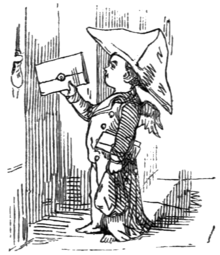afterwards, remembering his words; his looks; the song he sang; his attitude, as he leant over her or looked at her from a distance. As it seemed to her, no night ever passed so quickly at Mr. Osborne's house before; and for once this young person was almost provoked to be angry by the premature arrival of Mr. Sambo with her shawl.
George came and took a tender leave of her the next morning: and then hurried off to the City, where he visited Mr. Chopper, his father's head man, and received from that gentleman a document which he exchanged at Hulker and Bullock's for a whole pocket-full of money. As George entered the house, old John Sedley was passing out of the banker's parlour, looking very dismal. But his godson was much too elated to mark the worthy stockbroker's depression, or the dreary eyes which the kind old gentleman cast upon him. Young Bullock did not come grinning out of the parlour with him as had been his wont in former years.
And as the swinging doors of Hulker, Bullock and Co. closed upon Mr. Sedley, Mr. Quill, the cashier (whose benevolent occupation it is to hand out crisp bank-notes from a drawer and dispense sovereigns out of a copper-shovel), winked at Mr. Driver, the clerk at the desk on his right. Mr. Driver winked again.
"No go," Mr. D. whispered.
"Not at no price," Mr. Q. said. "Mr. George Osborne, sir, how will you take it?" George crammed eagerly a quantity of notes into his pockets, and paid Dobbin fifty pounds that very evening at mess.
That very evening Amelia wrote him the tenderest of long letters. Her heart was overflowing with tenderness, but it still foreboded evil. What was the cause of Mr. Osborne's dark looks? she asked. Had any difference arisen between him and her Papa? Her poor Papa returned so melancholy from the City, that all were alarmed about him at home—in fine, there were four pages of loves and fears and hopes and forebodings.
"Poor little Emmy—dear little Emmy. How fond she is of me," George said, as he perused the missive—"and, Gad, what a headache that mixed punch has given me!" Poor little Emmy, indeed.

